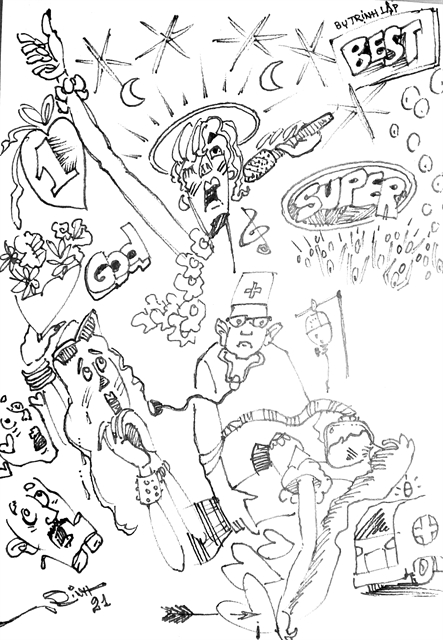 Talk Around Town
Talk Around Town

One of the all time chart-topping singers in Vietnamese showbiz recently released a song. As popular as the song got, it also got him into 2 major scandals within just a few months. Internet users were largely involved in protecting their idol from criticisms.
by Vân Anh
One of the all time chart-topping singers in Vietnamese showbiz recently released a song. As popular as the song got, it also got him into 2 major scandals within just a few months.
The short story/music video featured a young actress, who had signed exclusively with the top singer’s new entertainment company and become famous after the video. Before long, though, the singer’s rumoured girlfriend of seven years re-posted consolation cakes and messages from her closest friends on Instagram, with ambiguous statements targeting someone who had apparently meddled in her relationship and ruined it.
Netizens found out that his ex-girlfriend, had unfollowed the singer on Instagram. When that story was re-posted, it became the biggest gossip in town, with two terms being bandied about: Tuesday (the 'third day' in the week in Vietnamese and, in slang, the 'third person' in a relationship), and 'Trà xanh' (green tea in Vietnamese, a Chinese slang word for women who look innocent but are actually quite calculated and manipulative and are often interested in guys who are already taken).
Anti-fan groups popped up overnight, attracting large numbers of the singer's fans boycotting the actress. While the three have yet to publicly address the rumours, the actress is generally viewed as being the guilty party, with thousands of people targeting her online for her supposed “mistake”.
She became so disliked that her past as a semi-nude model was uncovered and posted all around social media, in what was a clear case of cyber-bullying. But these anti-fan groups quickly had hundreds of thousands of members. Some sources even questioned whether she could continue in showbiz after being the subject of such scorn. Advertising campaigns she featured in were taken down due to boycott calls from these anti-fans.

|
| Illustration by Trịnh Lập |
The second scandal revolved around the top singer’s music video being reported and then disappearing from YouTube for a day. Many had told beat producer GC about how similar the beats in the singer’s latest song were to his own. He reported the matter to YouTube, which temporarily removed the video. This angered many of the latter’s fans, who then left extremely disrespectful comments on GC’s Instagram. He replied, saying that his actions were appropriate and that the video would be re-uploaded soon after the dispute was settled.
The top singer has had a long history of scandals but he never addresses them or apologises. Maybe this makes his fans and supporters believe he needs protection. But even when you’re on a pedestal, not everything you do can be justified. He is, in fact, the key player in both scandals. Whether the first is true or not, the two women would not have an issue if the famous singer wasn’t part of their lives.
Blind worship of such a big star has become so common. Society today relies a lot on key opinion leaders (KOLs) to popularise ideas and products. But without any clarity surrounding stories/rumours and taking on board only comments read online, opinions can become quite skewed. Critical thinking is needed, even when using social media or navigating entertainment circles. It helps us avoid falling into the trap of believing purpose-built messages and allows us to identify fake news. It also reminds us to be civilised, polite internet users who don’t jump up and down at the slightest provocation, targeting someone and hounding them in cyberspace.
The whole saga involving the Vietnamese young actress is sadly reminiscent of the case involving Japanese reality TV star Hana Kimura, who committed suicide when she was only 21 years old after spiralling into depression because of a media narrative about how terrible a person she was, when in fact a large chunk of that was scripted. It remains uncertain whether the Vietnamese actress’s story is true or just mere rumour, so what gives anyone the right to criticise based on vague speculation?
Social media users don’t fully understand the issues, don’t analyse things critically, and often lack basic understanding of what is actually going on. They too readily adopt popular beliefs and trust “the mob”. Many people act so heatedly based on what is purely superficial information.
In the second scandal, while the singer may be in the wrong for plagiarism, people target their fury at GC. Plagiarism is taking someone else’s work and is never tolerated in academic settings. But many people believe it’s okay in the world of music.
It can be difficult to see clearly these days when we’re constantly inundated with information and opinions. It is essential to remain calm and keep our base emotions in check, reading different viewpoints instead of simply agreeing that what others say is true.
Before posting some dumb missive on a topic you’re woefully uninformed about, try putting yourself in your target’s shoes. Instead, how about cultivating some compassion and kindness, even for strangers on the “opposite side” of a particular issue or non-issue?
Respect personal boundaries, don’t dig up dirt or criticise their past, and don’t get tied up in anti-fan groups and their constant negativity. Be a smart fan, and a civilised and kind social media user. VNS




